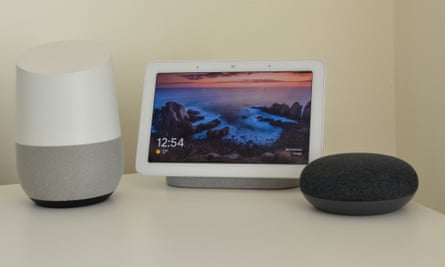Our family got a Google Home Hub for Christmas. As comparative lifestyle Neanderthals, we have so far only used it as a glorified digital picture frame and music player, though this is clearly not what it was built for. Say “Hey, Google”, tell it what you want, and a whole universe of entertainment, advice and help can be supplied – up to and including instant control of internet-connected doorbells, thermostats and more.
Contrary to their branding as “assistants”, the primary purpose of these devices is not to devotedly help the people who use them. At the risk of stating the blindingly obvious, once we have paid for the hardware, we get the services they can deliver largely for free, in return for limitless access to the small details of our lives. Big tech is therefore able to carry on making advertising more and more precisely targeted, and vastly increase the mountains of data that power its development of artificial intelligence. Smartphones, tablets and computers have been helpful, but evidently not helpful enough. Build data-gathering machines into the domestic sphere, and you break open whole streams of personal information.
Facebook’s influence is undoubtedly scary, partly because its senior management seems to have no clue about the responsibilities that should come with such power. But Google’s range of activities and penetration of our lives represents something else entirely. Its systems have soaked up and mastered the planet’s topography and most of its languages. In the UK, it has a presence in the NHS. Thanks to the range of offshoots and acquisitions now grouped with Google under the banner of Alphabet Inc, it is centrally involved in biotech, the development of driverless transport – and, through its artificial intelligence subsidiary, DeepMind, the pursuit of even more incredible technologies that will, sooner or later, transform everything from work to education.
Google expertise is also driving the idea of surveillance-heavy “smart cities”, which are beginning to capture the imagination of powerful interests across the world. As all its other activities grind on, it sustains its domination of the most mundane parts of our lives via Gmail, YouTube, the android smartphone system and its monopoly on online search. Its new assistants represent a step into unprecedentedly intimate spaces.

So, to use a very 20th-century phrase, what is to be done? The “techlash” of the last couple of years has left Google remarkably untroubled. But even so, you do not have to look too far for ideas. Perhaps both Alphabet and Google might be broken up, and their advertising operations would become standalone companies, with YouTube and Gmail similarly cut adrift. Maybe Google could be belatedly classified as a utility, and forced to allow open access to both its key algorithms and data sets, just as the US telecoms giant AT&T once gave up a range of its precious patents in return for its monopoly.
All of these things would be worthwhile. But as solutions they fall short in one fundamental sense: they deal with the manifestations of Google’s power rather than the root cause.
One glaring truth about the modern internet should be at the core of any meaningful conversation about it. From pluralistic, egalitarian beginnings, it has been transformed into a top-down system dominated by a few big players whose power is based on their control of data, with Google as the king. So perhaps something truly radical is required: a reconceptualisation of what the internet is, and what happens to the data that determines who controls it.
As the year unfolds, pay attention to the people who are talking about a new, decentralised internet – AKA Web 3.0 – and the possibility of data being returned to the control of the people who generate it.
In Boston, the worldwide web’s founder, Tim Berners-Lee, is working on a new way of using the internet. Called Solid, it is based around personal online data stores, or Pods, that contain the wealth of information people generate, and are their exclusive property. This means they can allow access to particular elements of their data from particular services as they see fit, and move their data from app to app instead of surrendering it (imagine, for example, being able to move between social networks, taking your lists of friends and followers with you). Berners-Lee and his people are also working on a new kind of digital assistant they have named Charlie, the raison d’être of which is the careful use of personal information, to make individual lives easier and better, rather than the idea of using it to sell us things (“Charlie works for you; Charlie doesn’t work for Google or Amazon”).
Then there are the possibilities bound up with the blockchain, the system of verification that sits under so-called cryptocurrencies. For instance, the blockchain offers a means of independently verified personal identity, which respects privacy far better than the Google and Facebook accounts do we are now encouraged to use across the internet. Blockchain technology has also opened the way to new models whereby endless micropayments can be made in return for particular online services or content; and, if people voluntarily allow elements of their data to be used, rewards can flow the other way. Here perhaps lies the key to a system beyond the current, Google-led model, in which services appear to be free but the letting-go of personal data is the actual price.
Just before Christmas I spoke to one of the founders of a Cambridge-based startup called Fetch, which is developing what it calls decentralised artificial intelligence, something that seems to represent a much more egalitarian vision than the one embodied by Google-style “assistance”. In their system, using the internet to satisfy particular wants would not involve indiscriminately surrendering data but judiciously sending out digitised “autonomous economic agents” to get help as and when we needed it. If we wanted a ride to work, or minute-by-minute access to the cheapest electricity, this is how we would do it: via a system that repeatedly connected different permutations of buyers and sellers, rather than by privileging huge platforms that render the rest of us digital serfs.
These ideas and models have the disadvantage of sounding offputtingly complicated, which could foster a certain fatalism. Maybe Google’s offer to its users is too simple, and the company’s dimensions now far too big to allow any space for alternatives. Besides, if anyone began to make headway by offering us greater privacy and control, we would hear plenty of protests about how severing the connection between huge data sets and the growth of artificial intelligence would be to hand the dominance of AI to China, where the twin forces of surveillance and innovation are stampeding on. I only know this: that tangled up in all this stuff are elemental questions about how we are going to live. And, even if it can play me my favourite song and tell me who’s at the door, Google does not have the answers.

